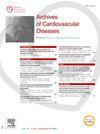Resveratrol cardioprotection associated with adipose tissue autotaxin pathway inhibition in a diet induced prediabetic female rat model
IF 2.2
3区 医学
Q2 CARDIAC & CARDIOVASCULAR SYSTEMS
引用次数: 0
Abstract
Introduction
Prediabetes is associated with an increased cardiovascular risk, but recent data also highlight the importance of the role of the liver and adipose tissue in cardiovascular risk stratification in this context. These inter-organ relationships still require further investigation, as well as finding new therapeutic approaches, especially in women who present a higher cardiovascular risk than men as early as the prediabetes stage.
Objective
Here, we evaluated the effects of resveratrol supplementation (RSV) on the heart/adipose tissue axis in prediabetic female rats submitted to high-fat-high-sucrose diet (HFS).
Method
30 Female Wistar rats were divided into 3 groups fed for 5 months with: a standard diet (CTRL), HFS diet (HFS) or HFS diet supplemented for the last 2 months with RSV (1 mg/kg/day in water) (RSV). In vivo Magnetic Resonance Imaging was performed to study cardiac morphology/function. Then, tolerance to ischemia-reperfusion (IR) injury was investigated ex vivo by simultaneous measurement of cardiac function (RPP, EDP) and energy metabolism by 31P Magnetic Resonance Spectroscopy. Finally, the expression of autotaxin (ATX) Enpp2 gene, a protein suggested to be involved in deleterious cardiac remodeling, in perirenal adipose tissue as well as its plasma concentration were measured.
Results
HFS diet induced glucose intolerance (P < 0.01 vs CTRL), deleterious cardiac remodeling (P < 0.05 vs CTRL), but also impaired myocardial IR tolerance, with diminished cardiac function (RPP, EDP) along with reduced ATP and PCr percentages of recovery during reperfusion (P < 0.05 vs CTRL). These HFS induced impairments were associated with increased adipose tissue ATX gene relative expression and ATX plasmatic levels (P < 0.05 vs CTRL). RSV supplementation ameliorated glucose intolerance (P < 0.01 vs HFS), restored deleterious cardiac remodeling (P < 0.01 vs HFS) and increased IR tolerance [higher cardiac function and ATP, PCr percentages of recovery during reperfusion (P < 0.01 vs HFS)]. Interestingly, these ameliorations were associated with restored adipose tissue ATX gene expression and plasmatic levels (P < 0.05 vs HFS).
Conclusion
A low dose of resveratrol, administered concurrently to an HFS diet, exerted cardioprotection by deleterious cardiac remodeling inhibition and increased IR tolerance. Interestingly, RSV cardioprotection was associated with the inhibition of autotaxin expression in perirenal adipose tissue and ATX plasmatic levels and suggests a yet unknown action path of RSV.
在饮食诱导的糖尿病前期雌性大鼠模型中,白藜芦醇心脏保护与脂肪组织自噬素途径抑制相关
前驱糖尿病与心血管风险增加有关,但最近的数据也强调了在这种情况下肝脏和脂肪组织在心血管风险分层中的重要性。这些器官间的关系仍然需要进一步的研究,以及寻找新的治疗方法,特别是对于早在糖尿病前期就表现出比男性更高心血管风险的女性。目的研究白藜芦醇(resveratrol supplement, RSV)对高脂高糖饮食(HFS)后糖尿病前期雌性大鼠心脏/脂肪组织轴的影响。方法30只雌性Wistar大鼠分为3组,分别饲喂标准饲粮(CTRL)、HFS饲粮(HFS)和HFS饲粮中添加RSV(水中1 mg/kg/d) (RSV),饲养5个月。采用活体磁共振成像技术研究心脏形态/功能。然后,通过31P磁共振波谱同时测量心功能(RPP, EDP)和能量代谢,研究体外对缺血再灌注(IR)损伤的耐受性。最后,测定肾周脂肪组织中autotaxin (ATX) Enpp2基因(一种被认为参与有害心脏重构的蛋白)的表达及其血浆浓度。结果shfs饮食诱导葡萄糖耐受不良(P <;0.01 vs CTRL),有害的心脏重构(P <;心肌IR耐受性受损,心功能(RPP, EDP)降低,再灌注时ATP和PCr恢复百分比降低(P <;0.05 vs CTRL)。这些HFS诱导的损伤与脂肪组织ATX基因相对表达和ATX血浆水平的增加有关(P <;0.05 vs CTRL)。补充RSV可改善葡萄糖耐受不良(P <;0.01 vs HFS),恢复有害的心脏重构(P <;0.01 vs HFS)和IR耐受性增加[心功能和ATP升高,再灌注时恢复的PCr百分比(P <;0.01 vs HFS)]。有趣的是,这些改善与脂肪组织ATX基因表达和血浆水平的恢复有关(P <;0.05 vs HFS)。结论低剂量白藜芦醇与高糖饮食同时服用,可通过抑制有害的心脏重构和增加IR耐受性来发挥心脏保护作用。有趣的是,RSV心脏保护与抑制肾周脂肪组织和ATX血浆水平的autotaxin表达有关,这表明RSV的作用途径尚不清楚。
本文章由计算机程序翻译,如有差异,请以英文原文为准。
求助全文
约1分钟内获得全文
求助全文
来源期刊

Archives of Cardiovascular Diseases
医学-心血管系统
CiteScore
4.40
自引率
6.70%
发文量
87
审稿时长
34 days
期刊介绍:
The Journal publishes original peer-reviewed clinical and research articles, epidemiological studies, new methodological clinical approaches, review articles and editorials. Topics covered include coronary artery and valve diseases, interventional and pediatric cardiology, cardiovascular surgery, cardiomyopathy and heart failure, arrhythmias and stimulation, cardiovascular imaging, vascular medicine and hypertension, epidemiology and risk factors, and large multicenter studies. Archives of Cardiovascular Diseases also publishes abstracts of papers presented at the annual sessions of the Journées Européennes de la Société Française de Cardiologie and the guidelines edited by the French Society of Cardiology.
 求助内容:
求助内容: 应助结果提醒方式:
应助结果提醒方式:


